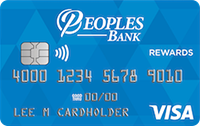Posted On: August 10, 2018 by Peoples Bank in: Budgeting Business Financial Education Mortgage Personal Finance Saving Money Savings

Getting a loan as a young person can be difficult.
Setting aside the issue of a short credit history, young people usually struggle to understand some of the loan basics, like what goes into a creditor’s decision or the difference between a secured and unsecured loan.
Creditors take many different factors into account when deciding on loan amounts, interest rates or whether to give money at all.
We talked to Melany Jennings, Vice President and Loan Officer at our Ogden branch, about the different types of loans and some of the decisions creditors make.
Secured vs. unsecured
Some of the common loans for young people are auto, personal, credit cards and student loans. A personal loan, student loan and credit card are considered unsecured loans because they aren’t directly tied to a piece of property or collateral.
If a borrower defaults on these loans, creditors can’t go after the property tied to the money. Because there is more risk for the lender in these situations, young people with a short credit history will have a harder time getting approved for unsecured loans.
Secured loans are tied to a piece of property. The most common secured loans are mortgages or auto loans. It’s easier to receive approval for these loans because if a borrower defaults, the lender can claim the piece of property attached to the loan.
So what goes into a creditor’s decision?
Unsecured
Young people out of college or high school may have a variety of reasons why they want to take out an unsecured personal loan — debt consolidation, moving expenses, vacations or weddings.
Credit scores are by far the biggest factor creditors consider. A typical good credit score — rated on a scale of 300 to 850 — is above 700 and excellent is above 800. Most scores fall between 600 and 750.
These scores represent the risk a lender takes when a person borrows money. The lower the number, the more risk a lender would take. The FICO score is the most well-known measure and was created by the Fair Isaac Corp.
Young people run into problems because they haven’t had the time to build up a good credit, which can take years to create.
If a young person is just starting to build their credit, they may have a harder time getting a personal loan.
But don’t worry, there are other factors creditors consider beyond the typical credit score. Here are some of the main factors:
- Income source
Where is the money to repay the loan coming from? Creditors want to see a source of income so they can trust that the borrower has the ability to pay the money back.
“It’s obvious, but we need to see that repayment source,” Jennings said. “We’ll be a little considerate on the length of employment, but it’s better if you can show you’ve worked consistently with the employer you’re with at the time of the loan.”
- Collateral
While unsecured loans aren’t tied to the item purchased, creditors may still ask the borrower to offer up collateral to back up the money. If the borrower defaults on the loan, the collateral could be claimed by the borrower.
- Co-sign
Another option creditors can give to potential borrowers is co-signing. For young people with poor or no credit history, they can turn to family members or friends with better history to co-sign a loan. But beware, if the borrower defaults, the co-signer will be on the hook for repayment.
Also, in recent years, Jennings said community banks like Peoples Bank have turned less to the co-signing option. While having a person co-sign a loan can give you more backing, having some type of credit history has become much more important.
“One of the things that really has gone away is the co-sign situation,” Jennings said. “We do really want to see a credit score. We want to see if they’ve established some type of credit with someone. We do want them to have a little bit of history.”
Secured
Secured loans are much easier for creditors to assess. Since these loans are tied to some type of collateral, like a car or house, creditors will gear the loan amount and interest rate toward how much the item is worth and the borrower’s credit score.
How can I better my chances of getting a loan?
A good place to start is building credit. Get a credit card and use it every month. Make sure to spend only as much as you can afford and pay off your bill every statement period. Over time, credit cards can be a tremendous asset to your score, but whatever you do, do not miss payments.
Another way to better your chances is to have some of those aforementioned factors: a reliable income, collateral or a co-signer.
Some financial institutions, including Peoples Bank, offer credit counseling. Institutions can help educate the borrower on responsible repayment. These sessions can help a person’s chances of receiving a loan.
“I think the counseling piece is really important,” Jennings said. “Don’t ignore bills or they will go to a collection account then when you do want that car or house, your credit will reflect you haven’t been responsible for paying your bills on time, that’s when it hits you hard.”
When it comes to a loan, don’t take the decision lightly. If you meet with a loan officer, be honest and forthright. Prove why you are responsible enough to receive a loan.
If you don’t prepare and understand what you’re getting into, getting a loan can be dangerous. Defaulting on a loan can affect your credit score and your ability to borrow money for the foreseeable future.




